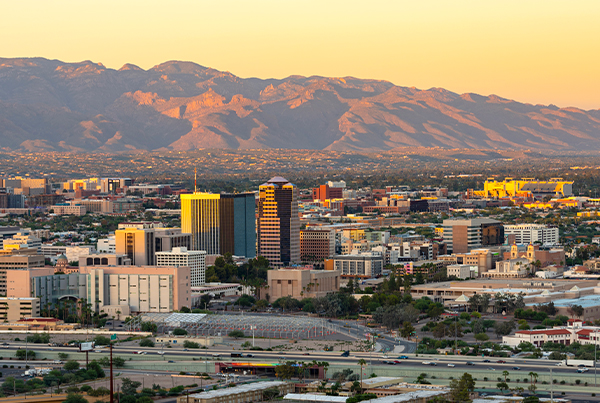
Every parent hopes that their child will never get into trouble. Unfortunately, some children end up in trouble, even being charged with a crime. Children accused of crimes can face serious punishments, including a stint in juvenile detention.
The Arizona Department of Juvenile Corrections runs several juvenile detention centers across the state, including Pima County. A juvenile detention center is where minors are detained after being convicted of a crime.
However, there are more services, including education, therapy, and other resources focused on rehabilitation. There are also many step-down programs for juveniles in Arizona that offer fewer restrictions than juvenile detention.
When Can a Child Be Detained in Juvenile Detention in Arizona?

A child can be sent to juvenile detention in Arizona if they are facing delinquency proceedings (meaning they are charged with a crime with probable cause) or if they are adjudicated delinquent (found guilty).
When a child is initially arrested, they can be detained for 24 hours before going before a judge. The judge can decide to keep the child in detention or to release them on a bond. A judge may decide to hold a child in detention if they determine the child is a danger to themselves or others, or likely to commit another offense if released.
After a child is adjudicated delinquent, the court may order the child to juvenile detention for at least 30 days. However, it could be longer depending on the child’s treatment needs and risk factors. The court will periodically review the child’s progress to determine if release is appropriate.
Children who are adjudicated delinquent for very serious crimes may be committed to juvenile detention until they turn 18.
Alternatives to Juvenile Detention
Not all children who are adjudicated delinquent will be sent to juvenile detention. There are many alternative punishments that the court can use.
These alternatives include:
- Juvenile probation
- Drug or mental health treatment
- Cognitive therapy
- Imposing a curfew
- Writing an apology letter
- Ankle monitoring
- Ordering a child to stay away from certain people or places
- Ordering a child to meet educational goals
A main benefit of juvenile court is that the judges have discretion to impose alternative punishments. A criminal defense attorney can argue for a less restrictive punishment than juvenile detention if your child is adjudicated delinquent.
What Is the Difference Between Juvenile Detention and Adult Jail?
Juvenile detention centers and adult jails have some similarities but also many differences. Juvenile detention centers are designed for children. The purpose is to rehabilitate children who are adjudicated delinquent.
On the other hand, adult jails are primarily designed to punish and incapacitate adult offenders. This means that while there are some rehabilitative programs, there are not as many as there are for children.
The juvenile detention centers usually offer robust:
- Educational programs
- Therapeutic counseling
- Mental health and drug treatment
- Recreational activities
Despite offering these resources for juveniles, it is important to remember that juvenile detention centers are still jails for children. The children are not free to leave and have many restrictions. Oftentimes, the programs are not as strong as those offered in the community outside of a detention facility.
Can Children Be Sentenced to Adult Jail?
There are some situations where a child is tried as an adult. This means that they face criminal charges in adult court. If convicted, the child could be sent to an adult jail. However, children sent to adult jails cannot have any contact with the convicted adults and are housed separately.
A child could be tried as an adult in Arizona if they are between 14-17 and commit a serious felony.
This could include a class 1 or class 2 felony, such as:
- Murder
- Manslaughter
- 1st degree burglary
- Arson of an occupied structure
- Armed robbery
It is mandatory for children aged 15 – 17 to be tried as adults for serious offenses such as murder, forcible sexual assault, or another violent felony.
What Are the Long-Term Effects of Juvenile Detention on Children?
If your child is facing juvenile detention, you need a lawyer. You should always advocate against juvenile detention because it can have significant negative effects on a child. While detention centers are geared towards children, they are still extremely restrictive.
Children in detention are very isolated. Their educational programs are not the same or as strong as traditional schools. They are removed from their community, including friends and family.
Children who are held in juvenile detention may experience:
- Depression and anxiety
- Increased mental health issues
- Disengagement
- Increased risk of future criminal behavior
- More likely to drop out of school
- Homelessness
- Increased substance abuse issues
- Worse overall health
These risks are a main reason why detention should be a last resort for juveniles. It should only be used in extreme cases where a child is truly dangerous. Otherwise, it can have a hugely negative effect and destabilize a child.
Contact a Criminal Defense Lawyer for a Free Case Review
If your child is charged with a crime, then you should contact a Tucson criminal defense lawyer for help. At Katsarelis Law Criminal Defense Attorneys, our team of criminal defense attorneys has over 45 years of combined experience. We are ready to fight to protect the rights of children facing juvenile detention.
Contact us today to schedule a free case review at (520) 510-0439.
